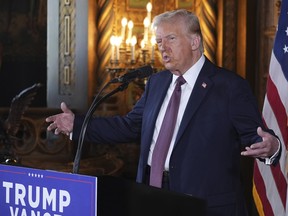U.S. president-elect Donald Trump has escalated his remarks about making Canada part of the U.S. during a press conference at his Mar-a-Lago resort in Florida on Tuesday. He reiterated that he intends to put ‘substantial’ tariffs on goods from Canada and Mexico.
A Threat to Canada’s Sovereignty
When asked if he would use military force to annex Canada, Trump replied ‘no — economic force.’ This statement has sparked concerns about the potential consequences of using economic pressure as a means to achieve his goal. He claimed that the U.S. is subsidizing Canada to the tune of US$200 billion a year, an apparent reference to the U.S. trade deficit and possible other factors.
The U.S.-Canada Trade Deficit
The total U.S. trade deficit in goods and services with Canada was US$40.6 billion in 2023, according to U.S. Census Bureau data. This deficit is driven by energy exports: the U.S. buys more than four million barrels a day of Canadian crude oil during some months.
A Response from Prime Minister Trudeau
Prime Minister Justin Trudeau responded to Trump’s remarks on X: ‘There isn’t a snowball’s chance in hell that Canada would become part of the United States.’ More than 80 per cent of Canadians are opposed to the idea, according to a recent poll. Members of Trudeau’s government had previously played off the 51st state remarks as a joke.
Economic Consequences
Canada is the largest external supplier of oil to the U.S., its uranium is the biggest foreign source of fuel for U.S. nuclear power plants, and its potash is a huge source of fertilizer for American farms. The Canadian dollar has dropped versus the greenback since Trump made a threat on Nov. 25 to put the tariffs on Canada and Mexico.
A Potential Trade War
In response to threats from Trump of 25 per cent tariffs, officials in Ottawa have been examining the use of export taxes on items such as uranium, oil, and potash as potential responses in case there’s a trade war. This development has sparked concerns about the potential consequences of a trade war between the two countries.
A Shift in Leadership
Trudeau announced his resignation on Monday, saying he doesn’t have enough support from within his Liberal Party to lead it into an election this year. Foreign Minister Melanie Joly posted on social media that Canada ‘will never back down in the face of threats.’ She’s considered a potential contender to succeed Trudeau.
A Conservative Perspective
Conservative Party Leader Pierre Poilievre, whom polls say is the odds-on favourite to win the upcoming election, has said Canada would ‘never’ be a U.S. state. When asked about those comments on Tuesday, Trump said: ‘Then maybe he won’t win. But maybe he will. Listen, I don’t care what he says.’
A Potential Impact on Elections
The threat from Trump to use economic pressure to achieve his goal has sparked concerns about the potential impact on Canadian elections. A representative for Poilievre didn’t reply to a request for comment.
Share Your Thoughts
Join the conversation by sharing your thoughts on this article in the comments section below. What do you think is the most significant consequence of Trump’s threat? How do you believe Canada should respond to these threats?
Trending Stories
- Los Angeles Faces Little Relief From Wildfires as Winds Persist
- History is Foreshadowing the Worst of Times for Markets
- Investor: A Cut in January, Then a Pause: What Jobs Data Mean for Bank of Canada and Interest Rates
- Economy: Howard Levitt: Trudeau’s Exit a Reminder of the Perils of Wrongful Resignation
Recommended from Editorial
- Ontario Strengthens Border as Trump Tariff Threat Looms
- American Exceptionalism is Not All Its Cracked Up to Be
Related Stories
- Trump Threatens 25% Tariffs on Canadian Goods
- Canada Prepares for Potential Trade War with U.S.
- Trudeau Resigns as Liberal Party Leader

